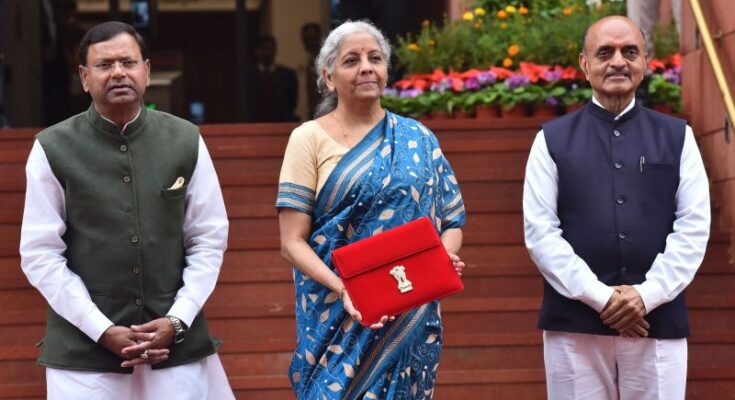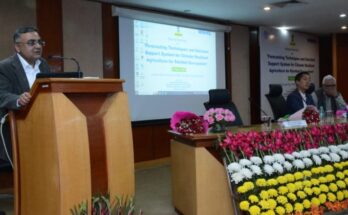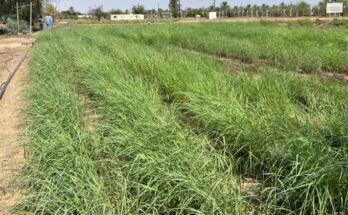New Delhi: In the wake of the Interim Budget 2024-25, tabled by the Union Finance Minister, Nirmala Sitharaman, experts from the agriculture sector are expressing their optimism and applauding the government’s forward-looking approach towards agriculture. The focus on reform, perform, and transform has been evident in the Government’s work in the last decade. The industry welcomes the allocation of a Rs 100,000 crore R&D corpus for 50 years, emphasising the government’s commitment to innovation and growth in the sector. Looking ahead to the full Budget, there is hope for further support through GST rationalisations, deductions on R&D expenses, and a conducive environment for increased investments in the seed industry.

Ajai Rana, Chairman, Federation of Seed Industry of India (FSII) and CEO and Managing Director of Savannah Seeds said, “Having steered the economy to a glorious path in the last decade with progressive reforms in agriculture, it is heartening to see the Finance Minister spell out the vision for making India Viksit by 2047 that relies on continued momentum on advances made so far. The seed industry is particularly happy to see the emphasis given to oilseeds and the imperative to make the sector self-reliant in this interim Budget,”
“We welcome the Finance Minister’s announcement on Atmanirbhar Oilseeds Abhiyan with a focused strategy on achieving self-reliance in oilseeds, such as mustard, groundnut, soybean, sesame, and sunflower. This is a timely and effective step that shall augment our aspirations to become self-reliant in this critical sector. As India continues to make rapid strides towards being a world leader, we must embrace globally approved technologies. The Rs 1 lakh crore R&D corpus allocation for 50 years with low or nil interest is a visionary move guided by a focus on Jai Jawan, Jai Kisan, Jai Vigyan, and Jai Anusandhan,” Rana added.
You may also like to read: Interim Budget 2024-25 promises stepping up value addition in the agriculture sector and boosting farmers’ income

Dr KC Ravi, Chief Sustainability Officer, Syngenta India and Chairman, CropLife India emphasises the significance of the robust physical-digital-social infrastructure developed in the past decade, providing a strong foundation for the vision of a developed India by 2047. The infusion of technology into agriculture is crucial for sustained growth, and the focus on self-reliance in edible oils and post-harvest activities aligns with this objective, he added.
Calling for pending reforms in the agrochemical sector, Dr. Ravi stresses the need for an enabling and science-based policy environment. He advocates for a reduction in GST on agrochemicals and budgetary allocations for production-linked incentives (PLI) to further strengthen the agrochemical sector and contribute to the vision of Atmanirbhar Bharat.

Siba P Mohanty, Managing Director, Hindustan Urvarak & Rasayan Limited (HURL) acknowledges the transformation and economic gains of the past decade, particularly in the context of individual households. The budget’s focus on direct financial assistance to farmers, crop insurance, and the adoption of Nano DAP highlights the government’s inclusive approach to development. The emphasis on Atmanirbharta in oilseeds is also appreciated for its timeliness.
You may also like to read: CropLife India welcomes Interim Budget and urges for the full Budget for the agrochemical sector

Madan Pandey, MD, Zuari Farmhub welcomes the government’s commitment to promote nano fertilisers, aligning with their organisation’s focus on innovation and sustainable growth. The introduction of Nano Shakti Nano Urea and Nano Shakti Nano DAP is seen as a positive step in empowering farmers, boosting crop yields, and enhancing soil health for a resilient agricultural sector.

Narinder Mittal, Country Manager & Managing Director – Agriculture Business, CNH Industrial India & SAARC applauds the continuation of PM Kisan Samman Nidhi Yojana, providing direct financial assistance to a significant number of farmers. The focus on oilseed production and processing is seen as a significant step in reducing import dependency and creating new avenues for agricultural growth. Mittal also appreciates the allocation of financial assistance for biomass aggregation, promoting sustainable agricultural waste management.

Anand Ramanathan, Partner, Deloitte India views the budget as supportive of growth and productivity in agriculture through interventions in crop insurance, nano fertilisers, and self-sufficiency in oilseed production. The focus on boosting dairy productivity and supporting seafood exports is highlighted as a key area of focus with potential employment opportunities for the rural economy.
You may also like to read: Cabinet approves extension of Animal Husbandry Infrastructure Development Fund for 3 years

Simon George, President, Cargill India and Managing Director of Cargill Food Business, South Asia praises the interim Budget as a vision pathway to a ‘Viksit Bharat’ by 2047. The focus on Atmanirbharta (self-dependence) in oilseeds production, increased emphasis on dairy and fisheries farming, and investment in post-harvest activities signal a transformative chapter in agriculture. George lauds the inclusive approach, emphasising youth, women, farmers, and marginalised communities. The foundational policies are primed to ignite fresh opportunities, spur demand, and trigger economic growth.

Rajamanohar Somasundaram, Founder and CEO, Aquaconnect appreciates the government’s efforts to address gaps in seafood production, technology intervention, financing, post-harvest infrastructure, traceability, and sustainability. The allocation of Rs. 6,000 crores under the PMMSY for supporting fish vendors, fishermen, and enterprises is seen as a positive step. The establishment of aquaparks is expected to play a vital role in promoting value-added seafood products and contributing to the development of coastal communities.

Jayen Mehta, Managing Director of Gujarat Cooperative Milk Marketing Federation (GCMMF), popularly known as Amul welcomes the comprehensive programme for supporting dairy farmers, emphasising India’s status as the largest milk producer globally. The proposed programme, building on existing schemes, is seen as a crucial step in improving dairy productivity and contributing significantly to global milk production.
You may also like to read: Odisha Cabinet approves scheme to provide MSP for minor forest produce; to benefit about 1 Cr tribals

Vasu Naren, Chairman & Managing Director, Sona Machinery, highlights the strategic initiatives like the Pradhan Mantri Kisan Sampada Yojana, which has empowered 38 lakh farmers and generated 10 lakh jobs, he emphasises the commitment to unlocking the true potential of agricultural produce. Naren commends the Pradhan Mantri Formalisation of Micro Food Processing Enterprises Yojana (PMFME) for supporting 2.4 lakh self-help groups (SHGs) and 60,000 individuals through crucial credit linkages. These initiatives, Naren notes, not only boost farmers’ income but also foster entrepreneurship and inclusivity. The commitment to reducing post-harvest losses and enhancing productivity remains strong, with complementary schemes poised to yield tangible outcomes.
Naren envisions a future where farmers thrive, the agricultural landscape flourishes and the nation reaps the dividends of sustainable growth. Emphasising the Atmanirbhar Oilseeds Abhiyan as a cornerstone of the agricultural strategy, Naren outlines a comprehensive approach. This includes research for high-yielding varieties, widespread adoption of modern farming techniques, robust market linkages, efficient procurement mechanisms, value-addition initiatives, and comprehensive crop insurance coverage.

Terming the Interim Budget 204-25 farmer-centric, Balram Singh Yadav, Managing Director, Godrej Agrovet Limited said, “The Interim Budget 2024-25 reiterates government’s commitment to strengthening the ‘Annadata’ and backbone of our nation – our farmers. From direct financial assistance through PM-Kisan Samman Yojana to expanding farmer-centric policies and promoting innovations, the budget paves the way for inclusive, sustainable growth in the agriculture sector. Initiatives such as e-NAM and PMMSY are empowering farmers with better market access and infrastructure. At the same time, the focus on enhancing the adoption of Nano-DAP showcases the government’s intent to handhold farmers amidst the continuously evolving weather conditions.”
You may also like to read – Need to make agricultural research demand driven with private sector engagement: Dr. Rajeev Varshney, Murdoch University
“The proposals to improve milk yields and aquaculture productivity in addition to achieving ‘Atmanirbharta’ for oilseeds, demonstrates the government’s commitment to food security and livelihood of generation across diverse agricultural fields. Overall, today’s Interim Budget 2024-25 offers a promising roadmap for empowering our farmers, ensuring food security, and propelling the agriculture sector towards a brighter future,” Yadav added.

Applauding the provision for direct benefit transfer to 11 crore farmers in the Interim Budget 2024-25, Puneet Vidyarthi, Head of Marketing & Business Development – India & SAARC, Case Construction Equipment and President, Rural Marketing Association of India (RMAI) said, “This year’s budget is people-centric with a solemn assurance of collective prosperity and inclusive development. The direct benefit transfer provided by the government to farmers is a strong step that benefits over 11 crore farmers every year. The continued support in providing ‘pakka houses’ in rural India through the PM Awas Yojana (PMAY) is a step in the right direction.”
Vidyarthi is optimistic about the Deen Dayal Upadhyaya Grameen Kasuhalya Yojana which guarantees high-quality skill development opportunities for the rural poor to secure a better future. “India is home to over 200 million artisans and the sector is the second largest rural employer after agriculture. The continuity of this Yojana benefits the artisan community and is also a continuum of rural India’s rich art and craft culture,” he added.
The reactions from experts across segments of the agriculture sector indicate a collective optimism and appreciation for the government’s initiatives in the Interim Budget 2024, with hopes for continued support in the upcoming full Budget. The emphasis on self-reliance, innovation, and sustainability emerges as key themes, reflecting the shared vision of a prosperous and resilient agriculture sector in India.
(With inputs from Mohd Mustaquim)





